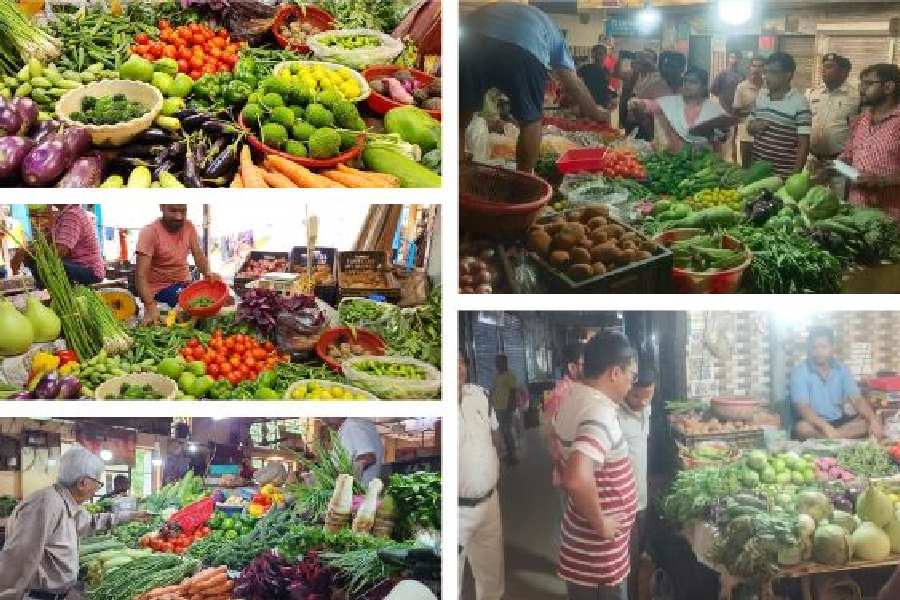Vegetable prices may have dipped a notch after the chief minister issued a deadline of 10 days to bring down prices of vegetables and task force members started visiting markets, but hawkers anticipate price fluctuations for another couple of weeks, claiming it is not up to them to regulate the rates.
Last week, chief minister Mamata Banerjee reacted to reports of spiraling vegetable prices across the city and constituted a task force to meet retailers and ensure prices were in check. In Salt Lake, many vendors who were paid such visits felt they were futile.
“We hawkers are too small to determine prices. What can we do if farm produce is deficit, middlemen are charging excessive markups and police are forcing us to pay bribes?” asked an exasperated vendor of GD Market.
“If the police see us carrying foodstuff out of the wholesalers’, they demand money or a sack of potatoes or three chickens out of our stock. Political goons do the same. To compensate for this loss, sellers are forced to hike the prices charged to customers,” said the hawker, asking not to be named. “So instead of targeting vendors, the task force should remove the rot from within.”
Pointing fingers
Many vendors are miffed at the task force visits. “They told us that even if we buy a vegetable at Rs 100 a kilo, we are to sell at Rs 60 because customers cannot afford more than that. Are we out to do charity then?” asked Tapasi Das, a seller at CA Market.
On Tuesday, the task force members told Santu Das of BJ Market to lower his profit margin for the sake of customers. “I’m already buying potatoes at Rs 32 per kg and selling at 35. If I lower my rate even further how do I pay labour, carriage, and rent for sitting at a corporation market?” he wondered.
Prices down
Sellers are accused of hoarding vegetables to create artificial shortage, and thus hike prices, but block market vendors pleaded innocent.
“We small-time retailers neither have the funds to buy, nor the space to store perishables in bulk,” said Ashok Porey of CK Market. “We had expected prices to rise for Jamai Sashthi and then Eid, but they never descended after that. Add to it the excessive heat, which was burning out plants in the fields, and then unseasonal rains that ruined crops.”
Still, after the government intervention, brinjal prices at his stall are now Rs 60 instead of 80, potol and lady’s finger are Rs 50 instead of 60, and tomatoes are selling for Rs 55 instead of 60. This has come as a relief to shoppers like Jnanendra Nath Bhattacharya, who felt prices were on fire until last week.
“Simply stepping into the vegetable market meant shelling out a minimum of Rs 250. But today I’m pleasantly surprised to find my bag of vegetables costing me just Rs 100,” said the CL Block resident, who then decided to buy a cauliflower as well from CK Market on Sunday.
Not low enough
Cauliflowers have been causing GD Market vendors much grief. “The inspection has reduced prices of a few vegetables, but not all. I’m still buying cauliflowers for Rs 80 and selling them at Rs 80,” said Bhaskar Mondal, touching his weighing scale to swear by it. “Customers are refusing to shell out more than this, so my target is simply to recover what I spent.”
He says he has been visiting three wholesale markets — at Sealdah, Muchibazar, and Kestopur — to select the best quality vegetables at reasonable prices. “Salt Lake customers won’t buy vegetables that look dull but won’t pay through the nose either. So they have reduced purchases. Instead of spending a fortune to buy for the entire week, they are buying for three days, hoping the prices will dip mid-week,” said Mondal. Bappa Moira of AB-AC Market says they have the option of getting local varieties of onions — for as low as Rs 30 instead of the Rs 50 Bangalore ones — but they look so puny Salt Lake customers wouldn’t touch them.
“Who says prices have come down,” thundered Jolly Chakraborty, an AC Block shopper at AB-AC Market on Tuesday. “Market forces are not driven by those sitting at Nabanna. If we want cheap vegetables we have to trek to Muchibazar ourselves.”
Moira of AB-AC Market believes prices will rationalise without external intervention now that the rains have come. “The rains came too late and too little. So it’ll take another couple of weeks for production to increase. Till then, we have to put up with high prices and low sales,” he said.
But the anonymous vendor of GD is pessimistic. “I know farmers who incurred heavy losses when their plants burnt out in summer, and now they don’t want to risk growing again. Their wives are getting Rs 1,000 a month under the Lakshmi Bhandar scheme, and other necessities are coming from rations. With farming becoming such an unpredictable profession, they are thinking of becoming domestic helps.”











